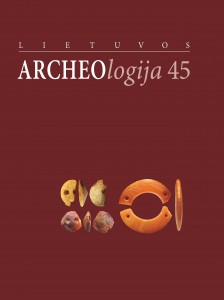BURNING ALT-WARTENBURG. ARCHAEOLOGICAL EVIDENCE FOR THE CONFLICTS BETWEEN THE TEUTONIC ORDER AND THE GRAND DUCHY OF LITHUANIA FROM A DESERTED MEDIEVAL TOWN NEAR BARCZEWKO (WARMIA, POLAND)
BURNING ALT-WARTENBURG. ARCHAEOLOGICAL EVIDENCE FOR THE CONFLICTS BETWEEN THE TEUTONIC ORDER AND THE GRAND DUCHY OF LITHUANIA FROM A DESERTED MEDIEVAL TOWN NEAR BARCZEWKO (WARMIA, POLAND)
Author(s): Arkadiusz Koperkiewicz, Felix Biermann, Christofer Herrmann, Edvinas UbisSubject(s): Christian Theology and Religion, Archaeology, Middle Ages, 13th to 14th Centuries
Published by: Lietuvos istorijos institutas
Keywords: Wars of Teutonic Order and Grand Duchy of Lithuania; conflict archaeology; Middle Ages; deserted town; Warmia;
Summary/Abstract: In the 14th century, the Teutonic Order and the Grand Duchy of Lithuania engaged in severe armed conflicts whose central element was raids on enemy territory. Since nearly all written evidence was authored by one side in the conflict, the chroniclers of the Order, the reliability of the reports in respect to violence and cruelties is not clear. Therefore, archaeological discoveries are of great importance for understanding these wars and their reality. An instructive example is the deserted town of Alt-Wartenburg in Warmia (Barczewko near Olsztyn, Northeast Poland), which was captured and destroyed in 1354 by a Lithuanian army and afterwards abandoned. Recent research has revealed considerable traces of the town’s violent end: burnt houses, weapons, skeletons of the victims, and other traces of ravages and violence. The site and the finds are discussed against the background of the written record, the warfare of its time and region, and other archaeological witnesses of this period.
Journal: Lietuvos archeologija
- Issue Year: 2019
- Issue No: 45
- Page Range: 265-293
- Page Count: 29
- Language: English

